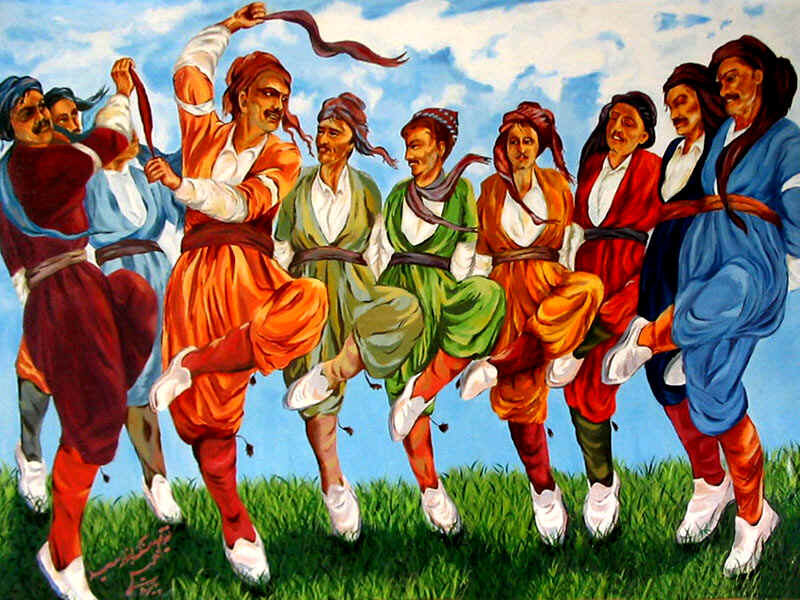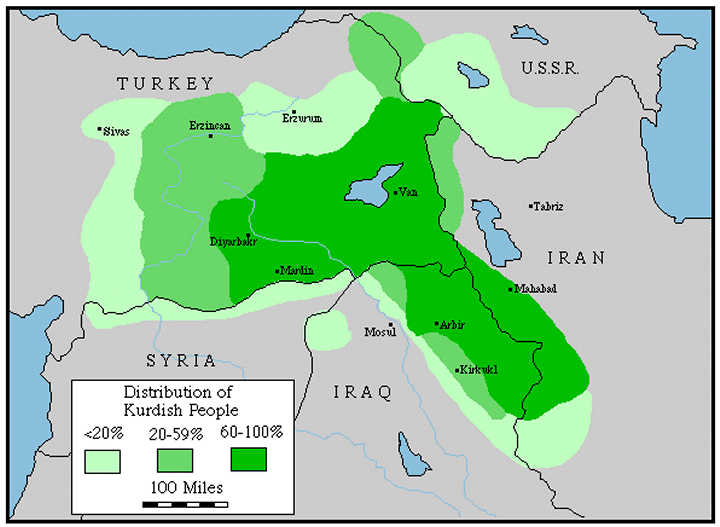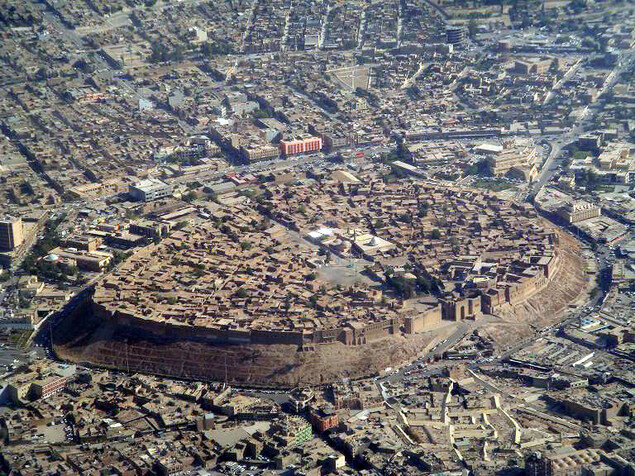THE KURDS: A PROBLEM WITHIN A PROBLEM 
The Kurdish problem – a people with their own language, traditions, culture and a strong ethnical identity – has continued without political solutions for many years amidst the uncoincidental general disattention of those countries, Western and non, that do not want to get on Turkey’s bad side or that simply do not want to add to the instability elements of a region that is marked by civil wars, social instability and by a rampant Islamic fundamentalism. The Kurdish issue begins with the fall of the Ottoman empire and with the subsequent treaty of Se’vres (August 10, 1920) with which the empire was dismembered. This treaty suggested the possibility of tutelage for minorities (such as the Kurdish) for whom the League of Nations envisaged the constitution of autonomous states (articles 62-64 of the treaty). The successive victory of Mustafa Kemal Ataturk’s nationalists in Turkey immediately slowed down the development of the Kurdish irridentism. The Turkish back-tracking was later ratified by the treaty of Lausanne (July 24, 1923) which indissolubly cancelled the grants awarded to the Kurdish just three years earlier. From that moment until the present day, the Kurdish problem has not been treated anymore like a political issue, but rather like a problem of public order, security and fight against terrorism. Geografically divided between Turkey, Syria, Iran and Iraq, the history of the Kurds was characterized by persecution, exploitation, pseudo-negotiations of pseudo-autonomy and social marginalization. The answer to all of these has often been terrorism on the part of the PKK (Parti Karkerani Kurdistan, “Party of the Kurdish Laborers”) that was founded as a political party in 1978 (a mix of Marxism and nationalism) but slowly transformed, through protests and sabotages, into an armed organization in 1984. The transformation of this movement into a terrorist organization has on one side emphasized the Kurdish demands in the minds of the world’s powerful, but on the other side it has reduced the PKK’s credibility and turned the issue into a mere security problem, thus disregarding the motives for the PKK’s behavior. The same bloody path has been chosen by other peoples in search of justice such as the Palestinians, but for the Kurdish it has not produced any acknowledgement.
The Kurdish issue in the single states
The main obstacle to the union of the Kurdish community in demanding autonomy has been the division of their peoples in four different countries. This has had an impact on the priorities and approaches to the issue of independence. The Kurds in Sirya have been associated to the regime and protected by it. Similarly to the other minorities in the country, they have been granted privileges but have also been instrumental in creating an anti-Turkish feeling when the regime in Damascus found it convenient. Today the Kurds of the PKK fight prevalently on Bashar al Assad’s side not so much because they believe in his cause (they are Sunni like the majority of the country, while the regime is Alawite) but because of their hostility with regards to Ankara. Kurds in Turkey have been the object of persecution and marginalization. Turkey has not granted them any form of self-determination or cultural identification. This is why their fight is mostly an armed one in juxtaposition with the Kemalian military nationalism of Turkey. The Kurds fight to obtain rights, but also for survival. The PKK and the Turkish authorities have been the object of reiterated condemnations because of their reciprocal brutality. The Kurdish minority in Iran, which is located mostly along the border with Turkey, is tollerated by Teheran and left alone so long as an intervention is not justified by military attacks or other public disorders. The Iranian Kurds co-exist with the regime which allows them a certain degree of autonomy. The Kurds in Iraq, after the fall of the Baathist regime that had fought and persecuted them, are now enjoying a great deal of freedom with regards to Baghdad. This freedom was not granted them but conquered by them during their fight against Saddam Hussein. This circumstance gives them the de facto possibility of creating their own state. There are however leftover contrasts between Baghdad and the Iraqi Kurdistan on the issue regarding the oil fields present in the territory under Kurdish jurisdiction. Altogether Kurdish claims encompass support for a regime, armed struggle, co-existence, and hope for a properly own state.
The Party of Kurdish Laborers (PKK)
The history of the PKK is intertwined with the Turkish and Syrian events. Like all the other irridentist movements of the 1970’s, the PKK is founded on a Marxist inspiration. Initially it was a political party, although with an extremist tendency (demonstrations, strikes, pressure on the Kurdish members of the army so that they resign). This configuration remains unvaried until a coup d’etat brings the Turkish military to power. From this moment on (September 12, 1980) all parties are dissolved and this gives the PKK, headed by Abdullah Ocalan, the opportunity (or the need) to move underground. The new military authorities in Turkey use the hard way. They sentence Kurdish militants to death, thus receiving terrorist attacks in return. It is a spiral of violence and a fight with no quarter that leaves the PKK in political isolation with regards to the other Kurdish parties in the region that share their objectives and claims: The KPD (Kurdish Democratic Party) and the KPU (Kurdish Patriotic Union) in Iraq, the PJAK (Party for the Liberation of Kurdistan) and the Democratic Party of Iranian Kurdistan in Iran. This war has produced at least 40.000 dead to this day. The PKK used bordering territories as bases to fight the Turkish army: sometimes in Iraqi Kurdistan, rarely from the Iranian side. Most of all from Syria. Damscus had ongoing border disputes with Turkey and was worried by the unilateral decision by Ankara to build a great dam on the Euphrates river. The result was that the armed confrontation spead instability not only in Turkey, but in the other bordering countries as well. Ocalan, also known with the battle name Apo, had found refuge in Syria. The Turkish pressures and threats had forced Damascus to expel him in 1998. After spending some time in Russia and in Italy, Abdullah Ocalan had fled to Kenya for fear of being extradited and had found refuge in the Greek embassy of Nairobi. Yet Athens wanted to get rid of him too, so during his transfer to the airport in order to reach a safe-haven elsewhere, Ocalan was captured and handed over to Turkish authorities. Since 1999 he has languished as the only detainee on the island of Imrali in a regime of isolation and precarious health conditions. His death sentence was turned into a sentence to life in prison. Yet his group continues to carry on the armed struggle. The PKK is listed in the US Department of State black list since August 10, 1998. It appears in the “Terrorism act 2000” approved by the UK parliament and confirmed in December 2011. It is listed among terrorist organizations by the European Council (as of June 26, 2012), by Australia, Canada, Ireland and, of course, by Turkey. The inclusion of the PKK among terrorist organizations has not helped in finding a diplomatic solution to the Kurdish problem through a negotiations table or an international mediation. The PKK was judged solely by its actions (which it enacted only on the basis of its claims) and not by the claims themselves which could have provided some justification for the terrorism. The Turkish position has been supported, for interest or acquiescence, thus leaving no room for alternatives to the armed struggle. The Kurdish claims have been upheld by another, more political, group: The “Koma Civaken Kurdistan” (“Community’s Union of Kurdistan”), previously called “Koma Komalen Kurdistan” (“People’s Conference of Kurdistan”). This group is in practice the political arm of the PKK and as such many of its members are presently imprisoned. 
Distribution of Kurdish people
Kurdish numbers There is no exact data on the numbers of this community because the countries in which they live have no interest in quantifying the Kurdish community’s weight in terms of numbers. In Turkey the Kurds’ numbers should sway between 12 and 16 millions over a total of 75 million inhabitants and should be concentrated in the south-east part of the country. In Iran there are an estimated 7 million Kurds, most of whom are Shiite. In Syria the Kurds are the most numerous ethnic minority. They are c.ca 2-3 millions and are concentrated mostly in the north-east of the country. The Iraqi Kurds are anywhere from 4 to 6 millions. If these numbers are correct, the Kurds in the Middle East are a total of c.ca 30 million to which must be added the numbers of the diaspora that have escaped cyclical persecutions in all of the above countries. All in all, the Kurdish community is one of the most numerous ethnic groups in the world without a state to call their own.
The Iraqi case
With the fall of Saddam Hussein that had persecuted them and with the new leadership in Iraq, the Iraqi Kurds have conquered a good deal of independence for Iraqi Kurdistan. This independence, although not sanctioned by the Baghadad government, is factual and very concrete. The two main Iraqi Kurdish movements, the KDP and the KPU, have clashed against each other in the past because of the struggle for power of their two leaders, Massoud Barzani and Jalal Talabani. Now they are brought together by the common objective of an increasingly independent condition. Barzani is President of the Region of Kurdistan since June 2005 while Talabani is the President of the Iraqi Republic since April 6 of the same year. Talabani’s designation, surely favored in part by the excellent relationship that he has with Iran, certifies the will of the Kurds to gain independence through secession and the creation of a Kurdish state, yet only – this is the subtle diplomatic game being played – when the political conditions allow such a breakaway. This diplomatic subtlety has made it so that Turkey, traditionally contrary to any independency claim by the Kurds (the Iraqi Kurdistan could have been a dangerous precedent to be imitated at home), has instead developed tight economic ties with this region. Iraqi Kurdistan has its own government and an army of Peshmerga that were never englobed in the national army, as demanded by the Baghdad government. It administers social life in the region independently, guarantees security and exploits the extraction of oil, thus developing a strong financial independence. It is a de facto state within the state. In March 2012, during a public speech, Massoud Barzani hinted to the nearing of such a historical goal, yet as both Barzani and Talabani know, it will not take place without the consent of bordering states, Turkey above all others.
The Syrian case
Since July this year, especially for military reasons, the Syrian authorities have given Kurds military control over the north-east part of the country that is inhabited prevalently by Kurds. This has allowed the regime to employ their military elsewhere in the country. Syrian Kurdistan is presently under the control of several Kurdish political entities affiliated to the Democratic Union Party (PYK), also considered to be the political arm of the PKK in Syria (lately they have been accused of receiving arms and money from the Iranian Vevak). In fact there have been two events detrimental to Turkish interests: the creation of an independently administered Kurdish territory (that could spawn independence claims or future secessions) and a tie between this territory and the armed struggle that the PKK carries out on Turkish ground. Yet that which worries Ankara most is the re-appearance in this enclave of another extremist group, the “Acilciler” (name which means “the urgencies” and which is inspired by a manifesto published after the 1980 military coup d’etat). The Acilciler is also known as the “Popular Turkish Liberation Party/Front” (THKP/C) and is headed by Mihac Ural, a terrorist on the run from Turkish authorities. Ural has ties to the Syrian secret services and is operative in the Turkish province of Hatay (from which derives another name for the group, the “Liberation Army of Hatay”). The group has 5-700 armed militants that could be used to support the PKK in operations against Turkish armed forces. The PKK and the Syrian Liberation Army have already clashed in the suburbs of Aleppo.
The present situation and the outlook for the future
The evolution of the Kurdish issue and obtaining independence can follow two alternative paths: – the armed struggle, as the PKK carries out. – a diplomatic solution The choice of one path rather than the other will be conditioned by the situtation in the region because, as is now clear, the issue is tied to the evolution of the situation in each of the states where the Kurds dwell. It is not a national problem, but an international one. Because of Turkey’s unwillingness to recognize the existence of the Kurdish issue and thus its unwillingness to find a solution for it and faced with the rigidity of the PKK, which sees the territorial approach as inescapable, what is happening now in Syria and Iraq could make room for further options. This will be possible if that which happens in those countries is regarded by their Kurdish populations as an opportunity and not as a payback. 
Erbil, Iraq
The meeting held by Iraqi Kurdistan President Barzani and Kurdish Syrian factions in Erbil in July – and the mediation effort thereof – is an important step ahead. Some factions had taken the side of Assad, others had sided with the rebels. The meeting was held to avoid that the Kurdish movement’s synergies be lost in the meanders of the Syrian civil war. It was an effort to unite the community regardless of their national specificity under the umbrella of the Iraqi Kurds. There is a second event that confirms the political importance of the Iraqi Kurdish group: in the beginning of August the Turkish foreign minister Ahmet Davutoglu had met in Erbil, through the good offices of Barzani, the same Syrian Kurdish factions (exception made for the PYK) expressing the Turkish hostility with regards to any form of independent Kurdish entity within Syria. Even though divergences between the Turks and Kurds persist, these attempts at dialog give the idea that a diplomatic solution could be sought. Also because in the past months the military activities of the PKK have grown exponentially. Yet the issue involves another, less visible, national entity: Israel. Tel Aviv has quite good relationships with Iranian Kurds, and excellent ones with the Iraqi Kurds. This because these communities have fought against their respective central governments which were enemies of Israel. They have thus obtained Israel’s liking (and practical support; in the past Israel had provided military assistence for Barzani). Furthermore, the Kurds never expressed the arab-muslim rhetoric with regards to the existence of Israel, being completely dedicated to their own existence and survival. Kurdish Hebrew communities have always been particularily protected in Iraqi Kurdistan. The fact that the Kurds are now a problem for Turkey – once the ally of Israel and presently strongly critical of their policy – is another favorable circumstance for Jewish policy (even though at the time of Ocalan’s arrest in Kenya, Israel was accused of having given the information to the Turkish secret service MIT). In the Middle East alliances and strategies often develop not because of political alikeness of the parts, but on the pragmatic cynicism of the moment. The recurring slogan is that the enemy of my enemy is my friend. The creation of an independent Kurdish entity in the Middle East would, in the eyes of Tel Aviv, weaken the arab nations in those areas where the Kurdish live, and provide Israel with a potential ally untouched by the rampant islamic fundamentalism. Presently (apparently) the relationship between Israel and the Iraqi Kurds have cooled down substantially because of Israel’s hostility with regards to the Iranian nuclear program. This creates relational problems because Iraq has yet to find a balance in their relationship with Iran (Iraq’s primary ally). In his April trip to the USA, the Iraqi President Massoud Barzani had avoided meetings with the American Jewish community. Yet word has it that Israel would have bases located in Iraqi Kurdistan from which to monitor Iran. As we’ve mentioned, that which will happen in the near future will influence developments and consequent possibilities to find a solution to the Kurdish problem. There is the Syrian civil war, the confrontation between Iran and Israel, the recurrence of the Palestinian problem and the precarious political balance in Iraq. In this context, the instability derived by the lack of a solution to the Kurdish problem can be added to the instability that already reigns in the region, thus becoming a problem within a problem.
